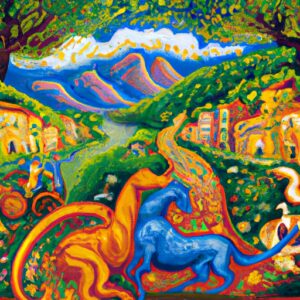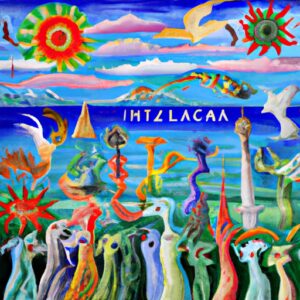A Journey Through the Beauty of the Italian Language
Italian is a Romance language that originates from Latin – the language of the ancient Roman Empire.
As the Empire fell apart in the 5th century, ancient Latin started evolving into different dialects, which developed into what we know today as Romance Languages.
With literature writings first, and Italy’s unification later, the Tuscan dialect became the foundation of the Italian we speak today.
Knowing Italy’s linguistic history is crucial to understanding some of the topics that are addressed in this article. If you know enough about history, then get ready to embark on this linguistic journey!
Phonetic Features that Make Italian Beautiful
Allora (so), let’s start by saying that it is impossible to define what beauty is.
In another article, we discussed whether Italian is the most beautiful language but, although many language learners claim so, we cannot rely on objective criteria to state it.
We can, however, rely on objective phonetic features that contribute to the melodious and expressive nature of the Italian language making it a very beautiful language:
- Italian does not have throat sounds found in other languages like French and Spanish.
- Italians often lengthen vowels, adding a lyrical quality to speech.
- Italian double consonants represent emphasis and intensity in pronunciation.
- Numerous tonal fluctuations and vowel richness contribute to its musicality.
- Italian words typically have stress on the second-to-last syllable, creating a rhythmic and flowing cadence.
- Italian speech has a natural rhythm and cadence influenced by its stress patterns and syllable structure.
- Italian tends to have a high proportion of open syllables, ending in vowel sounds, giving it a light and airy quality, pleasant to the ear.
As a language learner myself, I have been exposed to different sounds and phonetic patterns, and I have to be honest: these features really make Italian remarkably beautiful!
I am not surprised Italian is appreciated for its expressive sound, musicality, and smoothness.
What Makes a Word Beautiful?
Meaning and Association
If a language is beautiful for the way it sounds, why are some words more beautiful than others? Not surprisingly, the factors that contribute to making a word beautiful are not limited to its sound.
Meaning and association appear to be very relevant when rating a word’s beauty. The aesthetic appeal of a word can be enhanced by its meaning and the emotions it evokes.
- Serenità (Serenity): this word evokes a sense of calmness and peace, making it aesthetically appealing.
- Incanto (Enchantment): the word carries a magical quality, suggesting beauty and fascination.
- Dolcezza (Sweetness): not only does it not sound pleasant, but it also conveys a gentle and affectionate quality, enhancing its beauty.
Context and Combination
Words can gain beauty depending on the context they are used in and on their combination with other words, creating evocative phrases, sentences, and stories.
- Bacio (Kiss): while the word itself is beautiful, its beauty is amplified when used in phrases like bacio d’amore (kiss of love) or bacio della buonanotte (goodnight kiss), adding layers of emotion and tenderness.
- Sogno (Dream): in sentences such as Il mio sogno è diventare un artista (My dream is to become an artist), the word takes on a poetic quality, evoking aspirations and hopes.
- Abbraccio (Hug): when combined with phrases like abbraccio caloroso (warm hug) or abbraccio di conforto (comforting hug), it becomes even more beautiful, symbolizing comfort and support.
Cultural Significance
Some words are considered beautiful due to their cultural significance, be it Italy’s rich history, literature, or art.
- Armonia (Harmony): not only does this word sound melodious, but it also carries deep significance in Italian culture, representing balance and unity.
- Rinascita (Rebirth): with its roots in the Italian Renaissance, this word holds historical and cultural importance, symbolizing renewal and revival.
- Libertà (Freedom): it’s a word rich in historical and cultural significance, reflecting Italy’s struggle for independence and the value placed on freedom in society.
Beautiful words in Italian evoke feelings of Amore (Love), Passione (passion), and Nostalgia, reflecting the romantic essence of Italian culture.
Art and Literature
Also, Italian has been the language of some of the world’s greatest literary and artistic works, including those by Dante Alighieri, Petrarca, and Leonardo da Vinci.
Beautiful words are celebrated in poetry, literature, and art, contributing to Italy’s cultural identity and legacy, like Commedia, Sonetto, Opera.
Some beautiful Italian words carry symbolic meaning, evoking Italy’s landscapes and traditions, serving as important symbols for both Italians and fans of Italian culture everywhere.
- Bella (Beautiful)
- Gondola
- Palazzo (Palace)
- Dolcezza (Sweetness)
- Vino (Wine)
- Giardino (Garden)
Tourism and Worldwide Reputation
Others play a significant role in promoting tourism and attracting visitors to Italy, contributing to the country’s image as a destination rich in beauty, romance, and cultural heritage.
- Gelato (Ice-cream)
- Passeggiata (Leisure walk)
- Espresso
- Trattoria (Casual Italian restaurant)
- Aperitivo
- Caffè
- Vespa (Iconic Italian scooter)
Idioms and Expressions
The Italian language is proudly responsible for exporting many idioms as well, like In bocca al lupo (literally: in the mouth of the wolf) to wish people good luck!
I believe some of these expressions are as beautiful as many of the words that I have listed before.
Not only do their phonetic traits make them beautiful, but also their deep cultural significance adds precious value. In fact, idioms say a lot about the cultural context in which they developed.
Are you going to the restaurant with some friends and it’s time to pay the bill? Paghiamo alla romana! (literally: let’s pay the Roman way), that is, let’s split the bill equally.
This idiom says a lot about the way Italians, specifically Romans, perceive food and money when it comes to gatherings.
I do not mind if you ate more than me. We are having dinner together and I value your company, so we will all pay the same!
Have a look at some of the most popular idioms in Italian to learn more about the culture. I promise: è un gioco da ragazzi! (literally: it’s a children’s game; meaning: it’s a piece of cake).
Influence of Italian on Other Languages
Italian has undoubtedly left its mark across various domains and has influenced other cultures and languages.
Firstly, in the realm of music, Italian terminologies like Allegro, Piano, and Fortissimo are well-loved and widely used in music theory and performance worldwide.
Then there’s Italian cuisine, where words like Pizza, Pasta, and Risotto have become household names in kitchens worldwide.
Italy’s artistic and architectural legacy is also celebrated, with terms like Fresco, Rinascimento, and Barocco recognized internationally.
Italian fashion and design terms, such as Alta moda, Dolce vita, Paparazzi bring a touch of Italian flair to the global fashion scene.
References to Italian literature, cinema, and cultural concepts are commonly found in global discussions, as in Spaghetti Western, Maestro, Sotto voce.
So, from music to cuisine, art, fashion, literature, and everyday language, Italian’s cultural influence continues to brighten cultures worldwide!

What is Your Favorite Italian Word?
Have you learned new words? Did you finally understand why you love Italian so much? Or perhaps now you have an answer to the question “Why do I read or hear so many Italian words every day?”.
But more importantly: What is your favorite Italian word? Mine is Crepuscolo (Twilight) because it contains several different sounds and the mouth must move a lot to pronounce it!
Now, learn how to say beautiful in Italian.









